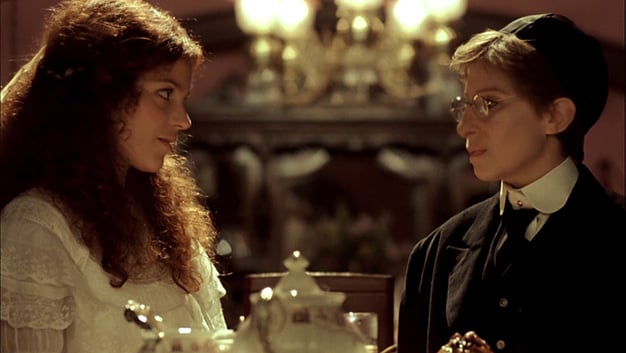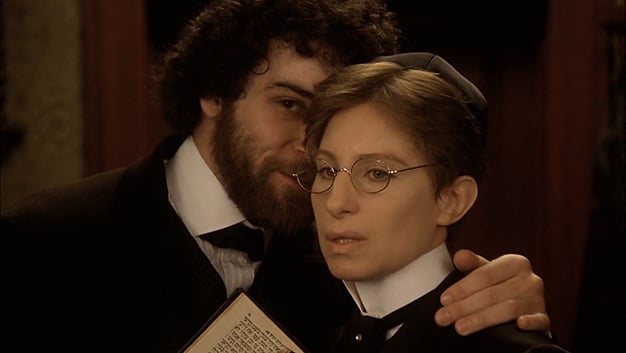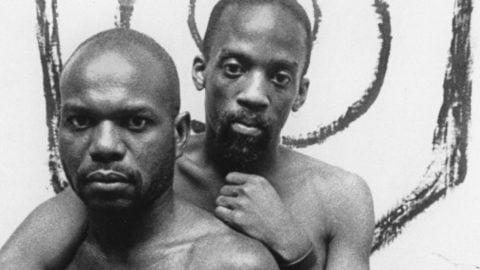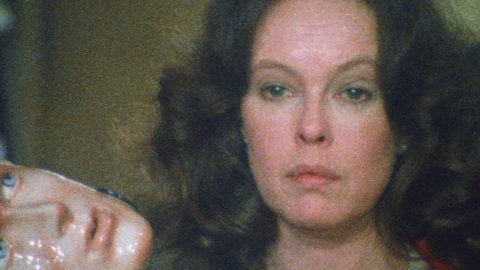Queer & Now & Then: 1983
In this biweekly column, I look back through a century of cinema for traces of queerness, whether in plain sight or under the surface. Read the introductory essay.

Yentl (Barbra Streisand, 1983)
The most instantly striking aspect of Barbra Streisand’s Yentl, a studio-financed hit that made back more than three times its budget, is its cultural specificity. Forthrightly Jewish, unabashedly feminist, and more than a little queer, this unorthodox musical, which Streisand directed, produced, co-wrote, and starred in, and for which she performed every one of its nine songs, is far from the kind of film you would see from today’s increasingly homogenized, risk-averse Hollywood. It’s also this very specificity that has long made it the butt of many a joke, outside of true-church Streisand aficionados (Yiddish names and cross-dressing? Oy gevalt!) Add the crucial fact that it’s a film by a woman, an industry titan for whom the double standard of Hollywood has been well-applied (two years earlier Warren Beatty had received praise and an Oscar for his own wildly off-trend personal directorial super-effort, Reds) and it becomes ever less surprising that Yentl would end up dismissed by many as middlebrow prestige rather than the frankly fascinating project it was and remains. There’s something about Yentl that made people uncomfortable, even beyond its female, queer Jewishness: its aesthetic and intellectual confidence, namely Streisand’s chutzpah.
As if it needed more points against its marketability, Yentl is also a film about the necessity of intellectual pursuit, knowingly bridging gaps between old-world Jewish tradition and the progressive politics of its contemporary moment. Streisand’s film adapts the basic plot of a ’50s-era Isaac Bashevis Singer short story titled “Yentl the Yeshiva Boy”—about a young woman in turn-of-the-century Poland who dresses as a boy in order to study Talmud at yeshiva after her rabbi father dies—to fashion a commercial but idiosyncratic exploration of identity, belonging, faith, and sexuality. A philosophical inquiry into the soul, which implicitly denounces the mistreatment and social inequality of women in centuries-old Jewish custom (as Yentl points out, as part of their morning prayers the rabbis thank God they were not born a woman), Singer’s story is remarkable in its candor and rejection of social norms. And though Streisand’s film adaptation—which is narrated via intermittent songs by the late, great composer Michel Legrand and lyricists Alan and Marilyn Bergman that function as internal monologues for the main character—didn’t please the author in its liberties and trumped-up musical virtuosity, she makes his questions her passion, and Yentl becomes wholly hers.
Apt for a film devoted to education—sentimental, Talmudic, and otherwise—the first shot is a close-up of a pile of books. They’re being carted to a shtetl by a salesman hawking “Picture books for women; sacred books for men!” The location is only identified as “Eastern Europe 1904,” though one surmises later that it’s near the town of Bychawa, Poland (the film was shot on location in Czechoslovakia, however). From the beginning, it’s clear that Brooklyn-born Streisand is going for a storybook evocation of turn-of-the-century Jewish life rather than a grimy realist depiction of hardscrabble marginalization. Yentl’s village might recall for today’s viewers the provincial little town of Disney’s Beauty and the Beast; like the also bookish Belle, Yentl is unwilling to accept the terms of her life as set out by men. Streisand’s film may also be a fable, but Yentl is no princess in waiting. Disinterested in darning a husband’s socks or producing children, she instead aspires to ensconce herself in secular and religious study, even though as a woman she is forbidden to do so. Without veering into slapstick, Streisand has a little fun with Yentl’s inability to keep her father’s house like a good grown daughter, burning the carp and ignoring the unleavened challah when she’d rather be reading and debating theology.
Behind shuttered windows and under cloak of night, her beloved rabbi Papa (Nehemiah Persoff) teaches her Talmud, her only lifeline to happiness. The shock of his death galvanizes her into action: Yentl scandalizes her fellow mourners by reciting the kaddish herself at his funeral, then she cuts off her hair and leaves home for good, disguised as a male student. After praying for her father’s understanding beneath a starlit sky (“Papa, Can You Hear Me?” the film’s most famous, and therefore most parodied song, which has been taken on by men in subsequent years as something of a gay anthem and is a requisite for male Streisand impersonators), she soon ingratiates herself with a group of boys on their way to yeshiva, hoping to be accepted into school. Though more than a trifle old for the role, Streisand at 40 is surprisingly convincing as the bespectacled boychik whose beard has yet to grow in. But it’s through Legrand’s cascading, minor-key, synagogue-prayer-meets-Broadway-ballad melodies and the Bergmans’ eloquent beseeching that she most persuades (“If I were only meant to tend the nest then why does my imagination sail / Across the mountains and the seas, beyond the make believe of any fairy tale?” she asks in “Where Is It Written?”), allowing the music to speak for and through her. It’s an odd choice, perhaps, for only one character in a musical to sing, and for those songs to give space to her thoughts to overwhelm the soundtrack. The decision is in keeping with the confused era of the post-golden-age movie musical, in which movies told through song had to work around rather than embrace their genre identity. (“A film with music” was the vague tagline.) Nevertheless, there’s a thrilling integrity and consistency here: each song functions as a new level of the character’s consciousness, a development of the self—as a thinker, as a lover, as a woman, as a man.
In a New York Times interview around the release of the film, Isaac Bashevis Singer criticized the film—and the director—in a way that one may find familiar: “We all know that actors fight for bigger parts, but a director worth his name will not allow one actor to usurp the entire play. When an actor is also the producer and the director and the writer he would have to be exceedingly wise to curb his appetites. I must say that Miss Streisand was exceedingly kind to herself.” Aside from the clearly and definitively gendered way a director is credited, Singer’s quote reflects much of the thinking around Streisand, who has long been painted as something of an egomaniac for daring to be a multi-hyphenate who appears in her own films. In addition to Beatty, messieurs Robert Redford, Ben Affleck, Kenneth Branagh, and Bradley Cooper are some examples of directors who have been praised rather than criticized for this.
That Streisand is indeed front and center for nearly all of Yentl thus becomes a liability in the eyes of some viewers, despite the fact that it’s hard to imagine anyone else in this role: if she had chosen not to perform all the songs, a more modest film would have been the dubious trade-off for one of the most exquisitely sung parts in the history of the latter-day American musical. Knowing her own strengths and how to best employ them, Streisand has never had time for playing the part of the demure artist. Streisand, who had been expected to receive a Best Director Oscar nomination for Yentl (after winning the Golden Globe award) and thus become the first American woman to be so honored, was unexpectedly left out. The word “snub” is overused, but this sure seemed like one; according to an April 1984 article in the Washington Post, “The nominations were widely interpreted as a personal slap at Streisand, who had defied most of the power brokers in the movie business—as well as her former companion, Jon Peters—by insisting on writing, directing, producing and acting in Yentl.”
Aside from the sexism inherent to the characterization, to constantly assail Streisand for being some kind of self-sufficient one-woman show also willfully ignores the fact that she has consistently proven to have palpable, winning chemistry with her co-stars, most of whom have been leading men, most notably Omar Sharif (Funny Girl), Ryan O’Neal (What’s Up, Doc?), and Robert Redford (The Way We Were). In Yentl, she has two romantic partners, a man and a woman, Mandy Patinkin and Amy Irving, each of whom enriches and elevates Streisand’s work, and helps ground what could have been an imitation Shakespearean comedy of gender confusion à la Twelfth Night into an emotionally leveling melodrama.

Yentl (Barbra Streisand, 1983)
Soon after Yentl, who has renamed herself Anshel, arrives at yeshiva, she becomes fast friends with her intense but kindly fellow pupil Avigdor, played by Patinkin with an appealing mix of earthiness and intellect. It isn’t long before Yentl/Anshel grows alarmed by her/his sexual feelings toward Avigdor, whose own cavorting with his new boyish friend seem to extend a bit past brotherly love, pinning Anshel down, staring in his eyes, and, much to the latter’s horror, trying to coerce him into skinny-dipping. Aware that the dramatic plight of Anshel’s attraction and the increasing plot convolutions of the film will live or die on the attractiveness of Avigdor, Streisand hangs much of the film’s second half on Patinkin’s animal magnetism. There’s an undeniable queer charge to many of their scenes together; as Anshel is overcome with blossoming lust for Avigdor’s bedroom eyes, many a gay viewer can likely relate to the idea of having to hide sexual feelings from that best “pal” constantly at your side. But is it her true self that she’s concealing, or just her carnal thoughts? One of the more subversive ambiguities of Yentl—more pronounced in Singer’s original story—is that it’s never entirely clear who she truly is or wants to be; is she transforming her gender only for the sake of studying or because of some deeper impulse?
Yentl becomes perhaps richest in its developments around Irving’s character of Haddas, Avigdor’s quiet, subservient fiancée from a wealthy family. Unlike Yentl, she prepares the fish and bakes the bread without fail; even her almond cookies are oppressively perfect. After Haddas’s superstitious parents refuse to grant Avigdor their daughter’s hand when they find out that his brother had committed suicide (claiming this would bring “bad blood” to the marriage), he convinces Anshel to marry Haddas in his place. For Avigdor, who has come to think of Anshel like a brother, this means he can keep Haddas close to him; for Anshel, who has come to love Avigdor, this means that he can keep Avigdor close to him. Once Haddas and Anshel are wed, however, the respect and understanding Anshel brings to the partnership, even if he cannot consummate the marriage, leads Haddas to fall in love with Anshel, her attraction exquisitely measured out by Irving in a quietly incandescent performance.
As is to be expected considering the mainstream nature of the film, this is all portrayed in the most eminently tasteful way possible: Streisand and Irving only share the slightest sisterly kiss. Yet the contortions of the plot are played with genuine pathos throughout, so that the desperate love each feels for the other characters in the triangle always registers as both humorously and tragically impossible. Of course, the two women don’t end up together, but in a relieving twist neither do Avigdor and Yentl, even after she reveals—in an admirably intense, expertly directed scene—her true nature. She chooses independence, education, and selfhood over love and marriage, and in the cathartic final number, “A Piece of Sky,” she belts out an anthem of liberation from the prow of a steamship clearly headed to America. It’s an ending that both evokes Streisand’s musical iconicity, visually referencing the “Don’t Rain on My Parade” tugboat showstopper from her 1968 breakthrough Funny Girl, while also cementing her film’s essential Americanization of Singer’s story, giving it a note of ambiguous optimism.
Streisand has claimed it took her 15 years to secure the funding for Yentl. Singer’s story first came to her around the release of Funny Girl, and she vowed it would be her next film—this was even before 1971’s Fiddler on the Roof dared to make a movie musical about shtetl life. Yet even that film, directed by Norman Jewison, was from a known Broadway property; Yentl, which United Artists eventually financed in 1982, was a pure gamble, the easily ridiculed passion project of a first-time female director. Though already a two-time Oscar winner, Streisand felt she had to audition as a director, sending in a Super 8 short film shot in Czechoslovakia to various studios as proof of concept; UA signed the deal after much rejection from others. Forced to work at scale, and with a limited budget (Streisand was unable to hire her dream DP, Vittorio Storaro, to shoot the film) and refused final cut by a studio perhaps still smarting from the staggering failure of Heaven’s Gate (1980), she nevertheless claimed in a 1984 Playgirl interview that the studio “didn’t touch my movie. Not a frame. They gave me complete control when I gave it away to them.”
While the other directors of the popular Hollywood “gender-benders” of the period, such as Sydney Pollack (Tootsie, 1982) and Blake Edwards (Victor/Victoria, 1982), went on to direct consistently over the next decade or so, Streisand has to date only directed two more movies, the 1991 Pat Conroy adaptation The Prince of Tides (nominated for Best Picture and not Best Director, an omission which proved again controversial) and the 1996 ugly duckling rom-com The Mirror Has Two Faces. In between, Streisand tried for years to make a film of the 1985 play The Normal Heart, Larry Kramer’s passionate account of the early days of the AIDS crisis in America, though was, by her own accounts, consistently thwarted by financing woes and fearful producers. (Ryan Murphy’s recent HBO adaptation can only serve to make one regret that Streisand’s version never came to be.) Yentl and her attempts to make The Normal Heart indicate that Streisand’s status as a queer icon—for both gay men and lesbians—goes beyond diva worship; in a film industry historically unkind to female entrepreneurs, she made it doubly difficult for herself by pitching films that can directly challenge sexual norms. It’s the interiority of Yentl—the wrestling with identity, love, and sex through song—that’s most gratifying. How rare that an American studio film makes you feel like you’re rattling around in its maker’s brain.
Michael Koresky is the Director of Editorial and Creative Strategy at Film Society of Lincoln Center; the co-founder and co-editor of Reverse Shot; a frequent contributor to The Criterion Collection; and the author of the book Terence Davies, published by University of Illinois Press.





